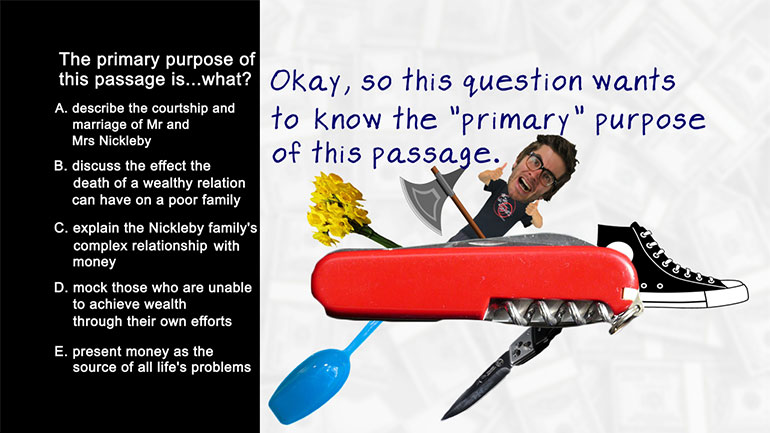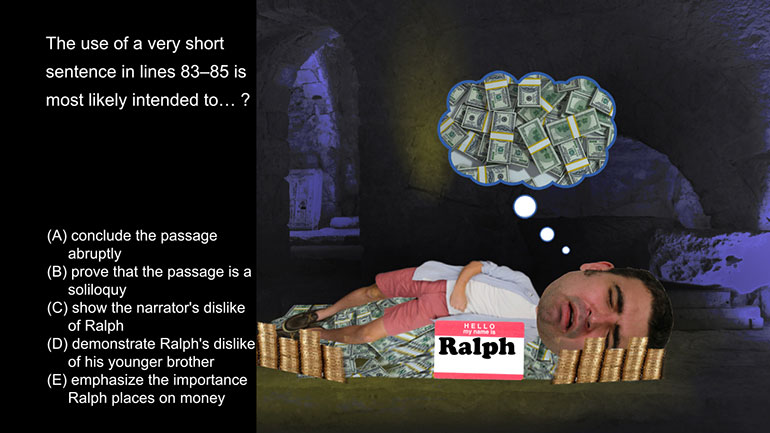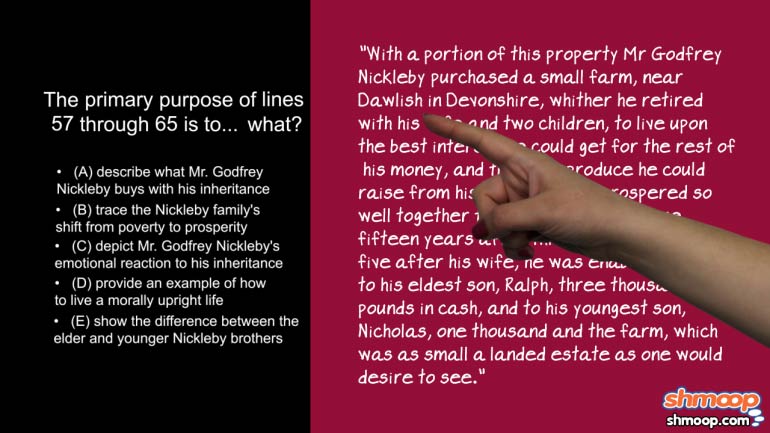ShmoopTube
Where Monty Python meets your 10th grade teacher.
Search Thousands of Shmoop Videos
Passage Drill 7 Videos 10 videos
AP English Literature and Composition 1.1 Passage Drill 7. The primary purpose of this passage is what?
AP English Literature and Composition 1.10 Passage Drill 7. The use of a very short sentence in lines 83-85 is most likely intended to what?
AP English Literature and Composition 1.2 Passage Drill 7. Which of the following best describes the narrator's feelings about the acquisition...
AP English Literature and Composition 1.2 Passage Drill 7 225 Views
Share It!
Description:
AP English Literature and Composition 1.2 Passage Drill 7. Which of the following best describes the narrator's feelings about the acquisition of wealth?
- Product Type / AP English Literature
- English / Imagery and Figurative Language
- Reading Literature / Analyze how complex characters develop and interact
- Reading Literature / Analyze how complex characters develop and interact
- Voice and Tone / Identifying author's tone or mood
- Voice and Tone / Identifying a character's tone or attitude
Transcript
- 00:03
Time to get your shmoop on...
- 00:06
Haven't had enough of the Nickleby's? Pause and review. It's even better the second time.
- 00:49
Which of the following BEST describes the narrator's feelings about the acquisition of wealth?
- 00:53
And here are the potential answers:
- 01:06
People have some very different feelings about money. Just about everyone likes having it,
Full Transcript
- 01:10
unless you're a Buddhist monk or that baby from the Capital One commercials.
- 01:14
But how does this narrator feel about the acquisition of money?
- 01:17
In other words, what does he think about the way money is acquired, or what that says about
- 01:22
the people who acquire it?
- 01:24
Does he think it makes people look greedy?
- 01:27
We should hope not. We like to acquire money.
- 01:33
The narrator acknowledges the importance of having money, so the desire to acquire it
- 01:37
must not be a bad thing.
- 01:40
Do only naturally immoral people want to acquire wealth?
- 01:43
Eh, pretty much the same thing as A. If this were true, we'd have a lot of very moral,
- 01:48
starving or dead people lying around.
- 01:51
C also focuses on morality, and we should have a pretty good idea by now that the narrator
- 01:56
doesn't think acquiring money has much to do with whether you're a good person or not.
- 02:01
Is the acquisition of wealth mostly a matter of chance?
- 02:04
Well, yeah. According to our narrator, anyway. He indicates it can have to do with the family
- 02:09
you marry into, inheritances you may or may not receive...
- 02:14
...basically, there are a lot of factors at play in determining whether or not someone
- 02:18
strikes it rich, and not everyone can be the inventor of Velcro.
- 02:25
D's our answer.
- 02:26
Just to wrap things up, E is a bogus option, because the narrator would never dream of
- 02:30
insinuating that we shouldn't be acquiring wealth.
- 02:32
In fact, he probably wouldn't even mind if you tipped him for writing this passage.
- 02:37
Just be sure not to under-tip. You don't want it to be insulting.
Related Videos
AP English Literature and Composition 1.2 Passage Drill 4. As which of the following is the object being personified?
AP English Literature and Composition 1.4 Passage Drill 3. How is Burne's view of pacifism best characterized in lines 57 through 67?
AP English Literature and Composition 1.6 Passage Drill 5. Death is primarily characterized as what?
AP English Literature and Composition 1.7 Passage Drill 5. Which line indicates the turn or shift in this poem?
AP English Literature and Composition 1.9 Passage Drill 4. Lines 32-34 are best understood to mean what?














